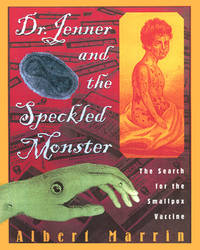The Speckled Monster
Contents:
THE SPECKLED MONSTER: A Historical Tale of Battling Smallpox
In researching cures and vaccines for various diseases, the U. Were the Newgate experiments conscionable within the ethos of 18th-century Britain? Why, or why not? Under what circumstances are experiments on human subjects conscionable today? Who should be asked—or allowed—to participate in such experiments?
What makes a medical hero? Was Zabdiel Boylston a hero?

Specifically why, or why not? Was Lady Mary a hero?
The Speckled Monster tells the dramatic story of two parents who dared to fight back against smallpox. After barely surviving the agony of smallpox themselves. The Speckled Monster is both a hair-raising tale of courage in the face of the deadliest disease that has ever struck mankind, and a gripping account of the birth.
Caroline, Princess of Wales? Under what circumstances might William Douglass have been a hero? Soon after her marriage, Mary's beloved younger brother died of smallpox, and in December she caught it herself—an encounter that nearly killed her and left her face so disfigured that she wore a mask in public for several months.
- The Speckled Monster Reader’s Guide.
- Smallpox: 'The Speckled Monster'?
- The Speckled Monster: A Historical Tale of Battling Smallpox.
- !
- !
- Additional Information.
Her unmasking came sometime before her August departure for Constantinople, where her husband served briefly as England's ambassador to the Ottoman Empire. It was among the Turks that Montagu learned the details of variolation, writing home with unfettered enthusiasm: Simultaneously, an analogous story unfolded on the far side of the Atlantic Ocean.
Here, we follow the life of Zabdiel Boylston, a Boston physician who like Montagu bore the telltale scars of a smallpox survivor.
Boylston, again like Lady Mary, was an iconoclast, at least in Carrell's portrayal. His approach was to "take knowledge wherever you find it" p.
As a consequence, when smallpox erupted in Boston in , Boylston was receptive to a description of inoculation circulated among local physicians by the Puritan minister Cotton Mather. Mather, it turned out, had gotten his knowledge from his African bondsman, a "Coromantee" slave named Onesimus. Smallpox swarmed through Boston and London alike in , but in both places variolation met with skepticism and violence, despite its long-established effectiveness in other parts of the world.
The second half of this historical novel details the quests of both Boylston and Montagu to gain acceptance for the procedure in England and her colonies.
In this account of early practitioners and advocates of 'inoculation,' or the use of tiny amounts of smallpox contagion to induce a mild case of smallpox and immunity, author Carrell weaves prodigious historical research with fictionalized dialogue to create a tale of two prominent figures: Zabdiel Boylston of Boston. Both Lady Mary and Boylston suffered scarring from smallpox, and, by living in the early 18th century, both witnessed the devastation of epidemics in terms of public health and private loss.
Both were also aware of the use of inoculation to prevent severe disease in Turkey Lady Mary visited with her ambassador husband and in Africa on the advice of Cotton Mather, Boylston interviewed Africans, slave and freemen, living in Boston.
The Speckled Monster: A Historical Tale of Battling Smallpox
Both faced formidable challenges and risked personal security to promote the use of this technique. Both proved their belief in the technique by the inoculation of their own children. And both, perhaps, met.
In light of current concern over bioterrorism, the threat of smallpox in a world that is largely non-immune the last case of smallpox was identified in , and efforts to weigh the risks of vaccination against the specter of such a weapon, this book is particularly relevant today. This is one of the most intriguing books I have ever read. The book also chronicles the natural course of the disease, its various symptoms, forms and popular treatments, and the political impact of smallpox on the royal families of Europe and business interests in Boston. I did not expect to like or even finish this book when I picked it up, but the style of writing drew me in and the story that unfolded kept me reading to the end and then past that through the end notes. Based on assiduous research and disciplined but lively imagination, this book succeeds at a daunting task: In particular, selected Newgate prisoners were offered pardon in return for participation in an experiment conducted by Mr.
At the behest of the Royal Society, Boylston traveled to London, witnessed numerous inoculations, and presented his Boston experience to the Society.
- Self Publishing (For Print) - Without Hives!
- How to Sleep Like a Baby, Wake Up Refreshed, and Get More Out of Life
- The HCG Guidebook
- Six Pieces. No. 5. Romance in F major (F-dur)
- Healthy Meals for Less: Great-Tasting Simple Recipes Under $1 a Serving
- Jurgen Habermas and Deliberative Democracy
- A Commented Study Bible With Cross-References - Book 43C - John 15-21